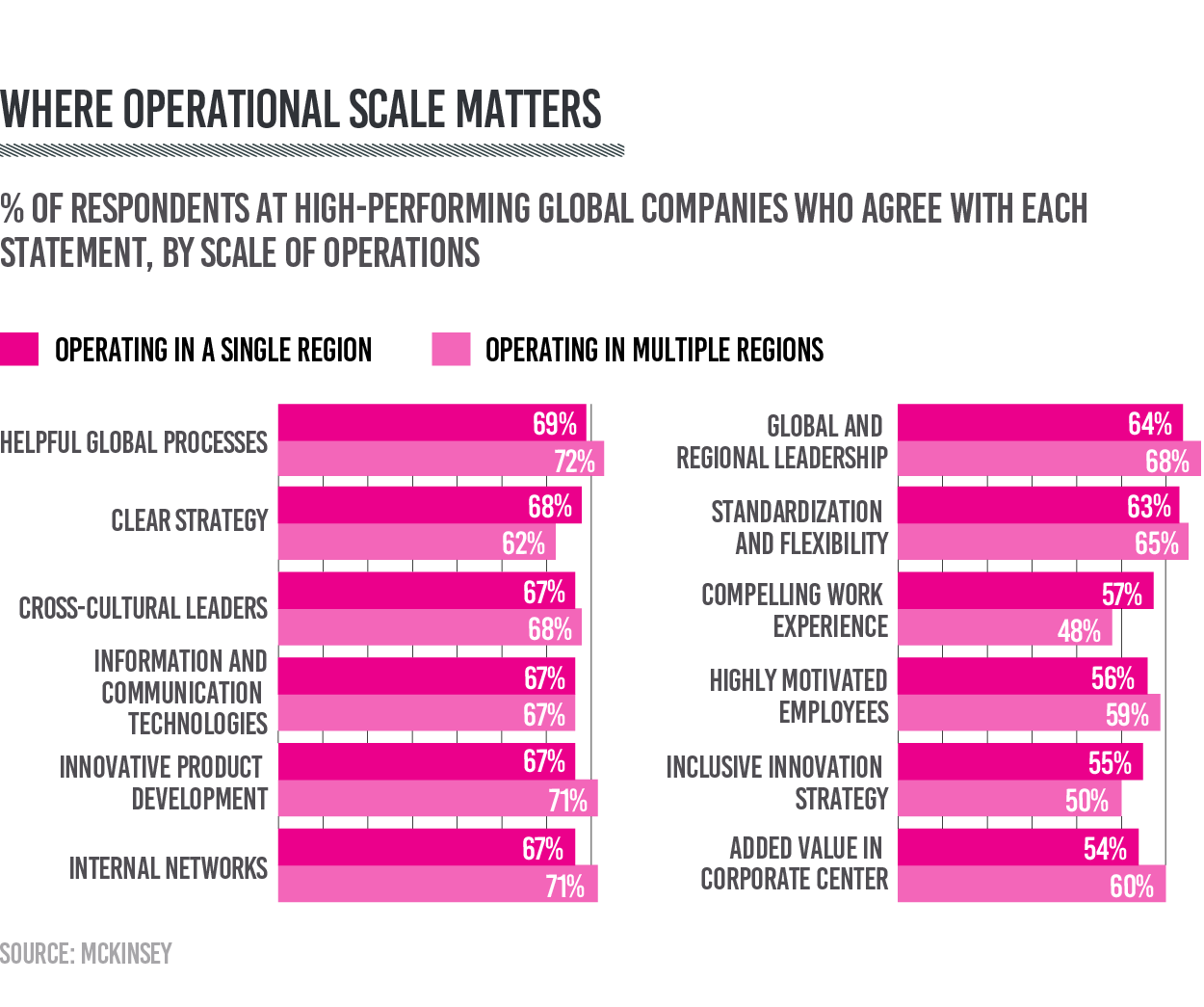![]() 7 minute read
7 minute read
Despite the social unease and frustration, the last 20 years have raised the global economy level. Global management is in demand and the processes are being reinvented towards globalization. This article looks into global management demand, global corporate culture, the skills for the future manager, and changing the role of Global Process Owners.
Operating in multi-regions
or from a single location
As a result of executives at global companies survey, McKinsey has highlighted two company types: those operating in more than one region and those earning revenue from many regions while operating in one. Both operational models have its distinct pros and cons. For instance, having people in the local geographies can boost the innovation, while single region companies can offer a compelling value proposition to their employees. According to the research, more percent of executives at companies with multiple regional operations underlined being good at R[&]D than other groups.
Nevertheless, the benefit of the global presence is obvious. Both types say that global companies are better able to create value than local. Also, leadership has been put as a key factor for improving operations across regions. This undeniably signals that the secret of success is the clear strategy, goals, and confident management. It is important to develop leaders that can navigate the cultural and functional demands of their global operations.
HBR puts it in three narratives: “globalization is a major driver of growth and prosperity; technological progress enriches our lives; shareholder returns reflect businesses’ contributions to societal progress.” At the same time, the skill of managing on the global scale becomes the forefront of the success. Global Manager is a strategist, coordinator, architect, all in one. It is a leader able to gather around talents and delegate responsibilities across the international organization.
New role of
Global Process Owners
Globalization becomes less centralized with the focus on local differentiation, digital interconnection and seizing for social impact. Deloitte’s survey underlines the importance of the Global Process Owners role in the global organization. The role of GPOs has been expanding from focusing on the efficiency of processes across the company to adding enterprise-wide value. GPOs take a responsibility of bringing global operations in one fluid process integrating the local demands in the well-operating structure. Nowadays, GPOs report directly to a ‘C’ level executive. Aligning the strategic agenda, GPOs advocate individual behavioral change, both internal and external, being the connector that creates the order in the chaotic environment.
The new managing positions for[nbsp]global organizations and establishing a connection will continue to pop up in the business environment. Technology is being an enabler to the growth of effectiveness and connectivity. In 2017, spending on enterprise software is expected to reach 354 billion U.S. dollars. Nevertheless, human factor would remain the most important recipe for success. Recruitment of Global Citizens to the company will ensure gathering best practices from locations around the world and its integration into company’s culture.
Development
Global Culture
The success of governing global organizations is in recognition of difference and commons – the diversity and specifics of cultures. Numerous ethnographic research has paved its way in the science due to the need for the human-centric approach. Similarly, global managers identify the understanding of different cultures as a path to successful international governance. As Edward Dolma, chairman and chief executive of Phillips, the international auction house, describing his way to successful global management, places the cultural education forefront: “At the core, while people have similar reactions to most things, there are significant nuances in the way people communicate, in what they expect in the workplace and how they balance work and private life.”
In the last decade, there has been a disconnect between business globalization and internationalization readiness of the students. Mostly, it has been led by faculty, students, and curriculum. The current agenda of leading business schools are placing internationalization and ability to connect with people on a global level on the same scale as economics. Moreover, as international mobility of MBA graduates is mediated both by the design of the curriculum and the location of the business school, it is essential to find a way to distribute talents across the globe. Raising a global citizen instead of international managers have been highlighted in the conversation about the future of global management. Global Citizen skills of open-mindedness and people-oriented. Besides having a solid business training, the expert is a leader and a credible global role model.
Globally, the popularity of MBA courses has grown, especially with online courses offerings. Also, students are opting for specialized business education rather than for a 2-year MBA program. According to the Graduate Management Admission Council, the share of candidates considering only business master’s degrees has increased from 15% in 2009 to 23% in 2016, while candidates considering only MBA programs decreased from 52% to 49% over the same period. It has lead leading business schools to open one-year courses focused on finance, marketing, accounting, or other subjects. Moreover, as the number of MBA programs growth worldwide, the potential job candidates is no longer differentiated from other by having Masters in Business Administration. It is true unless the degree has been acquired from the top global schools.
Adoption of part-time and shorter business courses will impact in better-educated society and level the overall business skills in the workforce. At the same time, GMAC 2017 Corporate Recruiters Survey reports that “59 percent of employers plan to hire Master in Management graduates in 2017, up from 50 percent that hired them in 2016. A greater percentage of employers also plan to hire recent graduates of Master of Accounting and Master of Finance programs this year.” This all signals that the demand for the knowledge is growing and the only way to satisfy it would be to enlarge the volume and shorten the education period. The MBA enhanced workforce will be the reality of 2025.
Leading
the global force
International Corporate Governance can be a tricky thing as governance systems are not uniform across the globe. There is a variety of factors that are inherent to the business ecosystem. To list a couple of them: is the different market environment, legal systems, standards, regulations, and last but not least, societal and cultural values. Governance systems are diverse as these features combine in many different ways in different locations. What are the ways to lead the global organizations?
One of the most vibrant examples of software helping organizations with leading their global operations would be SAP. With a track record of over 40 years, SAP has 11,500 Partner companies and seven global support centers. The company is developing together with its partners delivering over 1 300 industry-specific solutions. SAP helps its customer to streamline processes that improve efficiency, communication stream, as well as provides an ability to predict customer trends using live data. Being a leader in the enterprise applications market, the company has 125 million subscribers in their cloud user base. The secret of the global success of the SAP itself and its clients is the constant development and digital innovation in all the sectors. The partnership programs have given a new wave of leadership to the company.
For example, Infosys has been named as a ‘Leader’ in its EMEA and North America 2016 Magic Quadrant reports for SAP Application Services. Ravi Kumar, President, and Deputy Chief Operating Officer, Infosys said, “Being named a Leader for SAP Application Management Services by Gartner is a recognition of the investments we have made in our services capabilities. Infosys is focused on building innovative solutions to help clients reshape their digital landscape. Over time, these investments in new technologies and pre-configured industry solutions have streamlined and accelerated SAP-enabled transformation programs for our clients.” The development of tools for global management is on the rise, and its utilization is the right path towards global leadership.




